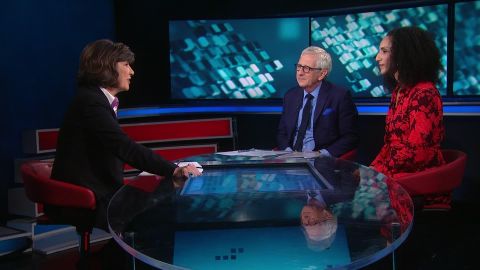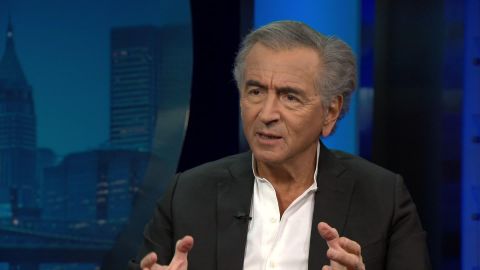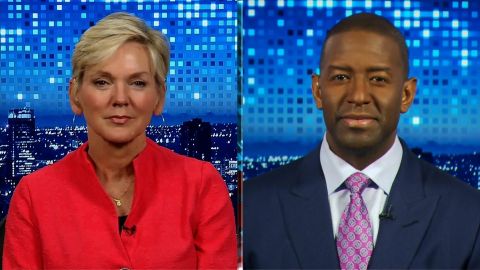Read Transcript EXPAND
CHRISTIANE AMANPOUR: All the way on the other side of the spectrum, the other big story of these past weeks, of course, has been the threat of war between Iran and the United States. And our next guest says, leave the Middle East at your peril. The French philosopher Bernard-Henri Lévy has gone to the front lines of the fight against ISIS alongside Kurdish fighters, and in two documentaries, “Peshmerga” and “The Battle of Mosul,” he paints the story of a people constantly abandoned by the West, while still always helping fight for our shared values and causes and he tells Hari Sreenivasan, ISIS is regrouping.
HARI SREENIVASAN: I know you have a group of films that you’re screening and the ones about the Kurds and the Peshmerga are of interest in this conversation. First, for our audience, remind us who the Peshmerga are.
BERNARD-HENRI LÉVY, DIRECTOR, “PESHMERGA”: The Peshmerga are the Kurdish fighters from Iraqi-Kurdistan. Those who did fight against ISIS from 2014 to 2018, who took Mosul and who defeated ISIS, those in other words, who were our boots on the ground in Iraq, and in all the area, those are the Peshmerga. Literally it means those who face death. Those are the Peshmerga. Those are those whom I followed for months in order to shoot tend to direct this movie.
SREENIVASAN: Well, why make the film in the first place? Why go beyond the ground with them in a month going from battle to battle?
LÉVY: It was at the peak of the triumph of ISIS, July 2015. We were in France. We received some huge terrorist attacks like you did in America, September 11, fourteen years before. I knew that we were defenseless in a way against these terrorists and that there was a people, the Kurds who were defending us, and who were doing that with loyalty, professionalism, and the great amount of courage. So I felt that the least we could do, journalist, the politicians or public individual was to try at least to understand, to try at least to convey their message. I felt challenged by their courage and by their devotion to the western values. It is not so frequent today in the Muslim world, people who is hundred percent devoted to equality between genders, rights of women, secularism, pro-West inclination, protection of the minorities, Christians and Jews, these are the Peshmerga.
SREENIVASAN: Now, there’s actually a clip from the film out of Mosul that I want to play that illustrates a little bit of what you’re talking about. And here we see Muslim troops erecting a cross back up. Let’s take a look.
(VIDEO CLIP PLAYS)
SREENIVASAN: Were you surprised with that scene?
LÉVY: I was not so surprised, but I was I was moved to tears — moved to tears to see these Muslim young boys, they came — there were a lot of snipers still around — taking the responsibility to take this cross and to put it again, I was moved to tears. And what I must tell you is that four years after, when I learned, when I heard that President Trump decided to withdraw his troops from the area, which means to abandon — to abandon these guys, to their destiny, to their destiny, I was moved to tears again, but for another reason not by emotion, but by sadness. It was so mean. And these decision to abandon the Kurds, to withdraw our troops, to leave them under the grip of Erdogan and of the Iranians and of Bashar Al-Assad, this was probably the biggest strategical and moral mistake of United States of America since I’m born. So when I see these images again, for me, I am heartbroken.
SREENIVASAN: How are they taking that abandonment now? I mean, where do they see themselves in the longer arc? Who do they ally with?
LÉVY: In this part of the world and maybe a little more for them, loyalty has a meaning.
SREENIVASAN: Your word is bond.
LÉVY: The word is bond. Yes. Your word is sacred. When you when you deal you deal. When you give you a word, you don’t take it back. And they took for granted the word of America. They took for granted all our rhetoric about fighting shoulder-to-shoulder against ISIS, international coalition and all of that. They took it for granted. And when they felt that that Trump decided all of a sudden by a tweet — by a tweet — to withdraw and to lead them in the mouth of the lion, they first did not understand. After that they had to recover. So some of them, they closed of Iraq, accepted the sort of compromise. With Erdogan, others in Syria are in the process of accepting a sort of compromise with Bashar Al Assad. In the two cases, it is compromise with the devil. But as a great general of Syrian Kurds recently said, the General Mazloum Kobani Abdi, he said, what do you want Mr. Westerner? We have to choose between genocide and compromise. After the abandonment — after the abandonment of the West, I choose that — genocide or compromise? We choose compromise. And when they see the escalation of the recent days, for example, they have no friendship for the Iranians, for example, but they are afraid because they know that they are on all sense of the word, on the front line — on front line — militarily, strategically.
SREENIVASAN: They could become the proxy war. They could be parties inside Iraq in this fight between Iran and the U.S. as it plays out.
LÉVY: My companions, my friends, the Peshmerga, the ones which I know well because of Iraq, which is the Peshmerga. Two years ago, after the defeat of ISIS, they organized a referendum of all the denomination, and already, they were abandoned by the Americans and by the Europeans. It was the Battle of Kirkuk and what happened then? Some proxies of Iran, some Shia militias, the Shia militias directed by General Soleimani, who was by the way, on the battlefield against them, came to them and crushed them and took over a part of their territory with the acceptance of Americans. Okay, now Donald Trump says that’s General Soleimani was a monster. But in September and October 2017, he gave to the monster part of the coalition territory. He withdrew in front of the monster and what I saw with my eyes at this time, Battle of Kirkuk, it was Shia militias with General Soleimani in the back, and with Abram tanks delivered by America.
LÉVY: Because the Abrams tanks of America were delivered to the government of Baghdad; from Baghdad, some of them went in to the hands of the Shia militias. And these Shia militias used your Abram tanks in order to crush, in order to kill some valiant Kurds who had been for since three years, you — and our best allies. So this war against proxies, those who are paying for it already at a high price are the Kurds, so they know that. They know that they have in front of them proxies of Erdogan on one side, proxies of Khamenei on the other side. And that when the difficulty becomes really hot, nobody to help. No American soldier. No European soldier either. No friendship except the mountains as they say.
SREENIVASAN: I want to play a clip from the film “Peshmerga” as well that just gives an illustration of a little bit of the fighting that was going on and a little bit of what you witnessed.
[VIDEO CLIP PLAYS]
SREENIVASAN: You spent some time with these guys. You had lunch and dinner and slept and ate with these folks. What is it that motivates them to get up and do this fight every day knowing that there are bands of killers on either side that they don’t have even the bulletproof vest, sometimes the support doesn’t come?
LÉVY: To defend their families, to defend their land and to defend their principles. The thing I heard most in all this month which I spent with the Kurds of Iraq is the following. We defend civilization. We are not fighting only for ourselves, but for the rest of the world. At the end of “Peshmerga,” my movie, there is a very, I think, moving scene, it was just before an assault against the recovery of the City of Sinjar, the Sinjar Mountain, so a very decisive moment. Some of them were going to die in the next hours. My simple question was, why are you fighting? Two thirds of them said, we are fighting for you.
SREENIVASAN: There are scenes where you are down in the underground bunkers of ISIS that is still line with explosives. And you see that level of infrastructure here. They have a newspaper that they’re reading in these tunnels. They have tins of food. It’s fairly organized.
LÉVY: Because of the retreat of America — the withdrawal of your country, because of the nothingness of Europe in this area, because of the dirty game of Erdogan, DAESH, ISIS is reviving. ISIS is coming back. And I was in some places it could be very soon in one of your dailies, my story in some places where I got and brought back some evidence that ISIS is coming back. These sort of tunnels which you are mentioning, they are dug again or they are reopened if they had not been found by the coalition. So the game is not over.
SREENIVASAN: Was the assassination or murder of Soleimani was necessary? Just?
LÉVY: Why is certainly not. Certainly not. There is also an act of the war. War is a terrible thing, but there is an act of the war between — since Sun Tzu until Clausewitz. There are some rules. You don’t escalate to the supreme degree all of a sudden.
LÉVY: So wise? Certainly not. He was a terrorist. No doubt. He was the architect of the dirty policy of the new Imperial Iran. No doubt on that, too. To send the drone to kill him in a moment where there was probably some diplomatic means to use in order to oblige Iran to withdraw, I think it was not a good way to do, no.
SREENIVASAN: So right now the Iraqi Parliament has set the wheels in motion. They’re saying, hey, we want all foreign troops out. What happens if they get their way?
LÉVY: First of all, it might be what Donald Trump wishes. Donald Trump was elected under the motto and the promise to get out of Middle East. What is true is that if this happened, if really, America is compelled to leave, and they freely — this fulfills a secret desire of your administration, those who will pay are the allies of America in the area, all of them. The Kurds with others — others. And you know what I mean.
SREENIVASAN: Does Iran fill that vacuum?
LÉVY: When you create such a huge vacuum as the one which Donald Trump created since his election, the vacuum is immediately filled by Erdogan in the old area of influence of the Ottoman Empire, by Putin who is recovering his dreams, and our nightmares who is rebuilding a sort of belt — Imperial belt around the Russia. By Iran, by China, of course, by the most radical Sunni Islam, which is the former Caliphate, of course. It is filled by some revisionist powers who have the nostalgia of the past greatness, and they are the guys we are just saying. So for me, if Turkey was a democratic country, if Iran was governed by the ladies and boys who are demonstrating in the street for Human Rights, I would have no objection of them filling the vacuum. But the problem is that these countries are governed by terrible guys, enemies of their own people, making war not only against us, but against their own population. This is the point.
SREENIVASAN: How does Europe see all of this playing out and look, the American President has said they should be doing more, whether it’s paying more into NATO? Or if they care so much about the rest of the world and the regions, let them get more involved. Let them put more boots on the ground.
LÉVY: Should Europe do more? Of course. It is the only point on which Trump is right. Even Trump can be right. And it is true that Europe does not do enough. And to be frank, Europe does not even exist in military terms. There is no common defense. There is no common force, despite the will of Macron. President Macron is a real European patriot, but he is very alone. One example, when Trump announced his decision to retreat from Syria, there was I think, 2,000 troops, American troops. If the 27 countries of Europe had decided to fill the vacuum, it was not so difficult. Two thousand divided by 27, your big turtle will make the division. I am not so good in calculation. It was it was doable. We did not.
SREENIVASAN: Why does the United States have a responsibility to that region, right? All of the supporters of the President who put him in power say, you know, there is no solution to the Middle East. It was maybe wrong for us to go there in the first place. But let’s get the hell out. One way or another, whether they’re showing us the door or whether we’re leaving of our own accord. What’s it to us?
LÉVY: You can say that, but then no surprise, if you — if we see in front of us a Persian Empire revitalized, if we see the former Soviet — a big Russia, not Soviet now rebuilds, if we see Israel under fire and under attack by your very strong Hezbollah, okay. It’s your choice, it is not mine.
LÉVY: And it is not the choice of the America which we — which most of us love. But this is the problem, we can decide that we have nothing to do with this area and that America becomes a fortress and you upon the fortress, then we’ll build some walls, and that what happens beyond these walls is not our business. It’s a choice. But my belief is that in terms of morality, and in terms of interest, of self-interest, it will be a disaster to accept this partition of the world, to accept that half of the world goes back to darkness, and to those revisionist powers, it will be the worst calculation for our society’s economies and vision of the world.
SREENIVASAN: Bernard-Henri Lévy, thank you so much.
LÉVY: Thank you.
About This Episode EXPAND
Christiane Amanpour speaks with a former governor and mayor about what’s coming up in U.S. politics. She also speaks with a British journalist and historian about the state of the British monarchy. Hari Sreenivasan speaks with French philosopher and writer Bernard-Henri Lévy about his recent documentaries highlighting the front-line of the fight against ISIS.
LEARN MORE


